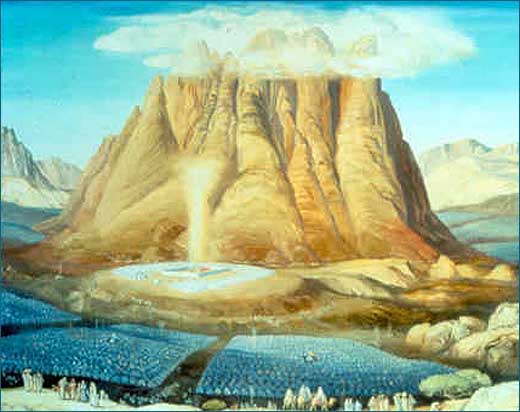Forced to Be Free

By Bezalel Naor
The Talmud (Shabbat 88a) takes literally the verse in Exodus 19:17: “They stood beneath the mountain.”
Said Rabbi Abdimi bar Hama: This teaches that the Holy One, blessed be He, held the mountain over them as a vat, saying to them, “If you accept the Torah, good; and if not, there will be your burial place.”
The question arises (and this question was already posed by the French Tosafists ad locum): Why the need for coercion? Hadn’t the Jews already willingly accepted the Torah when they said “Na’aseh ve-nishma’” (“We will do and we will hear”)?
Over the ages, various solutions to the problem have been offered.
The Tosafists themselves suggest that the coercion was imposed in order to preclude a retraction upon the part of the Jewish People—a distinct possibility once they were presented with the frightening spectacle of the great fire which sent their souls ”flying” from their bodies.
The Midrash Tanhuma (Noah) draws a distinction between the Written Law and the Oral Law. The willing acceptance of the Jews was restricted to the Written Law; it did not extend to the Oral Law. The mountain perched over the heads of the people was intended for the Oral Law.
Maharal of Prague (Gur Aryeh to Exodus 19:17; and Tif’eret Yisrael, chap. 32) writes that the point of the coercion was to make a statement that something as essential to the existence of the world as the Torah cannot be left up to the choice of Israel. Torah is an absolute necessity of existence and must not be misconstrued as merely an option.
This conundrum is a classic discussion in the world of the yeshivot, and as I said, many different solutions have been offered.
I share with the reader the solution of Rav Kook, which is as brilliant as it is original.
Freedom of will is a particular content [that exists] so that man may perfect thereby his ethical ability; for that reason, man has control within his domain and compass. But the very essence of the will is the essential condition of man, and in regard to man’s very foundation it is inappropriate to speak of “freedom.” We are not free men to will or not to will. The will is the essence of life, and life is found in us without our choosing. We control only the direction of the will, whether to the right or to the left. Here there is the hand of will.
Were the Torah to extend only to the ethical content of man, then it would be fitting that the Torah be given with total freedom of choice. But in truth, the Torah is the expression of the quintessence of man per se. Transgressing Torah is the same as man’s alienation from himself…Therefore it is fitting that the Torah be revealed as an essential revelation, a revelation of the root of will, and not a revelation of the branches of will.
(Rabbi Abraham Isaac Hakohen Kook, ‘Eyn Ayah, ed. Filber, Vol. IV [Tractate Shabbat] [Jerusalem, 2000], chap. 9, par. 67 [p. 191])

